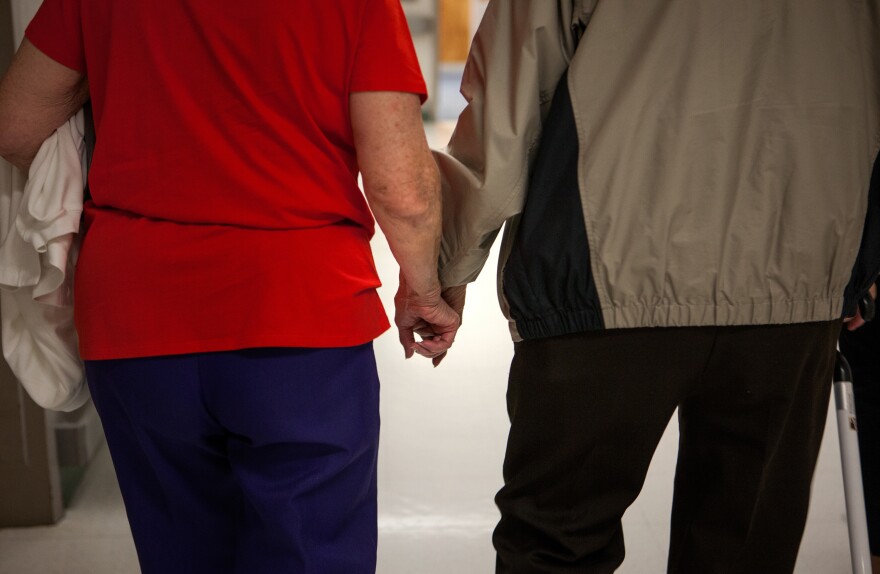Charles "Lindy" Cavell could never forget what the U.S. military tried to hide. Cavell fought to bring to light the secret mustard gas testing program he had participated in during World War II and for VA compensation for the test subjects. He died at home Wednesday at 89.
Cavell was featured prominently in an NPR investigation last year that found the Department of Veterans Affairs failed to notify mustard gas test subjects — who had been sworn to secrecy about the testing — of their eligibility for compensation, and routinely denied help to those who qualified for it.
During the last year of his life, Cavell was finally granted additional benefits and some back pay after a 26-year battle with the VA, according to his daughter, Linda Smith.
"I think he felt like he had finally accomplished something, and he was relieved that other service members were being recognized" as a result of the stories he was featured in, Smith said.
Cavell was a 19-year-old Navy recruit fresh out of boot camp in 1945 when a commanding officer offered the chance to participate in a "special program." The officer gave few details, but said volunteers would get two weeks' vacation and an award in exchange for participating.
"We were just a bunch of young kids. We didn't know any better," Cavell told NPR last year.
More than 60,000 Army and Navy troops raised their hands for the experiments, which ranged in severity from a few beads of toxic gas dropped onto the undersides of their wrists, to full-body inundation.
Cavell said when officers ordered him and 11 other test subjects into a heated gas chamber at the Naval Research Laboratories in Washington, D.C., it was too late to back out.
"We had ceased to be volunteers," Cavell told NPR last year.
Officers locked the chamber door from the outside and piped in mustard agent.

The military kept the tests off of the troops' personnel records — and swore the troops to secrecy under threat of dishonorable discharge or court-martial.
Half a century later, in 1990, Cavell and a few other test subjects went public with their stories, pressuring the Pentagon into declassifying the experiments and releasing test subjects from their oaths of secrecy. But even after the secret was out, and despite assurances from the Pentagon and VA, trying to obtain compensation proved futile for many.
The first heart attack hit Cavell at age 40 — and was followed by decades of chronic vascular and respiratory ailments requiring more than 20 operations at the VA hospital near his home in Midlothian, Va. He also developed congestive heart failure and kidney disease.
For decades, the VA refused to cover his medical expenses, saying Cavell hadn't proved his participation in the tests — even though he had more proof than most: From the Navy, he'd obtained copies of the laboratory notebooks from the experiments. They described the tests in great detail, including the temperature and humidity levels inside the gas chamber. Down the left side of the page, the names of test subjects are listed, with Cavell's name written in neat handwriting. But that wasn't enough for the VA.
"They say, 'We need more information,' " Cavell told NPR last year. "It doesn't make sense."

Cavell waged a steady fight for benefits while he worked long hours at the TV repair shop he owned, to support his wife Hilda and four daughters.
"He never wanted us to be involved in any of that. But behind the scenes he was working on paperwork," according to his daughter Linda Smith.
Her father loved people, Smith told NPR, but he was a quiet presence at home. During retirement, he often spent time in the garage, sitting at an old metal desk under fluorescent tube lights, fixing household appliances.
"He didn't share a whole lot. I think the tinkering and working on computers kept the mind away," Smith said.
But sometimes the memories of being inside a gas chamber overcame him.
"There was no handle on the door. You couldn't get out," he told NPR last year. "And that's what I have problems with today. If I go to a locked door, I panic sometimes to try to get out."
Cavell's health declined rapidly in the final years of his life, according to his family.
Earlier this month, he chose to go off of dialysis because of the pain.
Five days before he died of kidney failure, he took his final project out to the garage — a white Sunbeam toaster that wouldn't engage — but never got to finish it.
He is survived by his wife, Hilda Cavell, and three daughters — Linda, Mary and Joan. His daughter Margaret died in 2010.
A warm sun blanketed his family at his funeral in Richmond, Va., on Saturday. Two Navy officers folded an American flag and presented it to his wife while a third played taps.
In his obituary, Cavell's daughter Smith wrote that her father "went on a new journey to a place where there are no more wars to fight mentally or physically."
Copyright 2021 NPR. To see more, visit https://www.npr.org. 9(MDA5NTM4MTIyMDE0MTg3NDc2MTVlZjdmNQ001))




